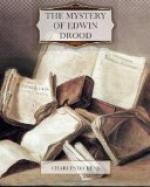The concluding ceremony came off at twelve o’clock on the day of departure; when Miss Twinkleton, supported by Mrs. Tisher, held a drawing-room in her own apartment (the globes already covered with brown Holland), where glasses of white-wine and plates of cut pound-cake were discovered on the table. Miss Twinkleton then said: Ladies, another revolving year had brought us round to that festive period at which the first feelings of our nature bounded in our—Miss Twinkleton was annually going to add ‘bosoms,’ but annually stopped on the brink of that expression, and substituted ‘hearts.’ Hearts; our hearts. Hem! Again a revolving year, ladies, had brought us to a pause in our studies—let us hope our greatly advanced studies—and, like the mariner in his bark, the warrior in his tent, the captive in his dungeon, and the traveller in his various conveyances, we yearned for home. Did we say, on such an occasion, in the opening words of Mr. Addison’s impressive tragedy:
’The dawn is overcast, the morning lowers,
And heavily in clouds brings on the day,
The great, th’ important day—?’
Not so. From horizon to zenith all was couleur de rose, for all was redolent of our relations and friends. Might we find them prospering as we expected; might they find us prospering as they expected! Ladies, we would now, with our love to one another, wish one another good-bye, and happiness, until we met again. And when the time should come for our resumption of those pursuits which (here a general depression set in all round), pursuits which, pursuits which;—then let us ever remember what was said by the Spartan General, in words too trite for repetition, at the battle it were superfluous to specify.
The handmaidens of the establishment, in their best caps, then handed the trays, and the young ladies sipped and crumbled, and the bespoken coaches began to choke the street. Then leave-taking was not long about; and Miss Twinkleton, in saluting each young lady’s cheek, confided to her an exceedingly neat letter, addressed to her next friend at law, ‘with Miss Twinkleton’s best compliments’ in the corner. This missive she handed with an air as if it had not the least connexion with the bill, but were something in the nature of a delicate and joyful surprise.
So many times had Rosa seen such dispersals, and so very little did she know of any other Home, that she was contented to remain where she was, and was even better contented than ever before, having her latest friend with her. And yet her latest friendship had a blank place in it of which she could not fail to be sensible. Helena Landless, having been a party to her brother’s revelation about Rosa, and having entered into that compact of silence with Mr. Crisparkle, shrank from any allusion to Edwin Drood’s name. Why she so avoided it, was mysterious to Rosa, but she perfectly perceived the




